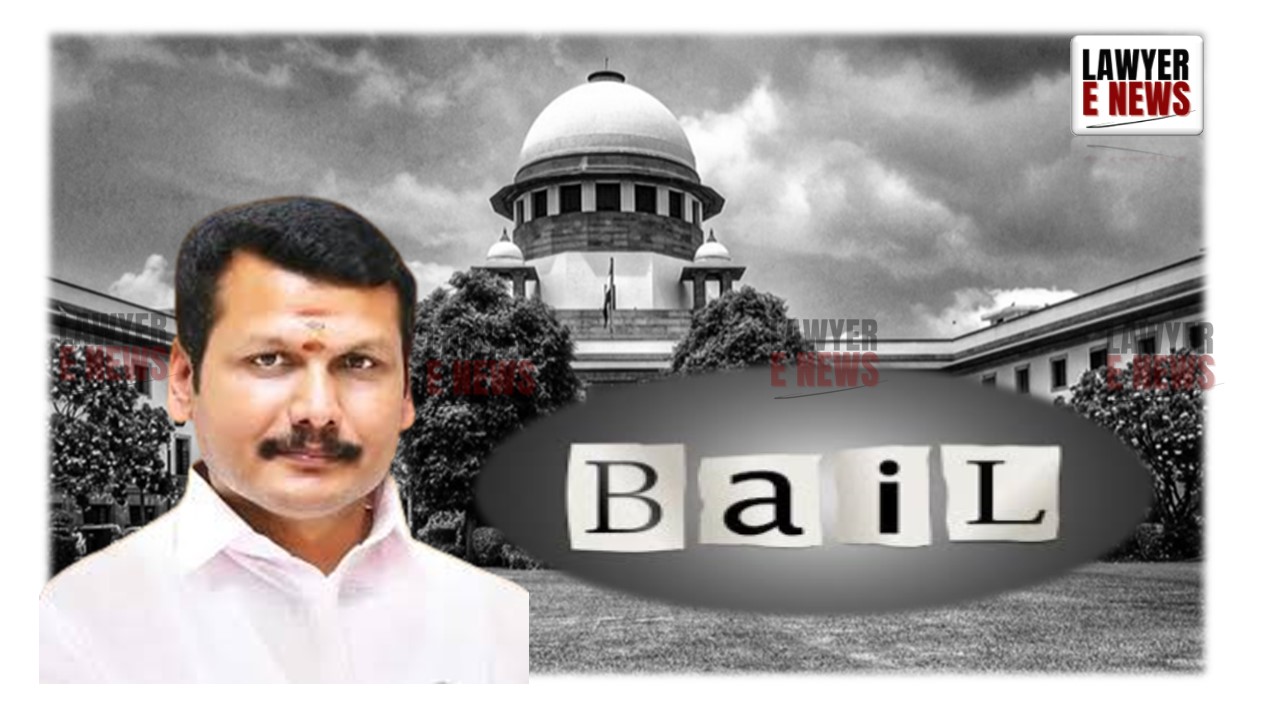-
by Admin
15 February 2026 5:35 AM



Today, Supreme Court of India, in V. Senthil Balaji v. Deputy Director, Directorate of Enforcement, granted bail to Tamil Nadu MLA V. Senthil Balaji, who had been detained under the Prevention of Money Laundering Act, 2002 (PMLA). The case revolves around a job scam that allegedly took place during Balaji's tenure as Transport Minister of Tamil Nadu between 2011 and 2016. The Court granted bail due to prolonged incarceration and delays in trial proceedings, stating that continued detention would violate his constitutional right to a speedy trial under Article 21.
The case against V. Senthil Balaji is based on allegations that he, along with his associates, collected large sums of money by promising employment to numerous individuals in the Tamil Nadu Transport Department. Between 2011 and 2016, Balaji served as Transport Minister, during which time three First Information Reports (FIRs) were lodged against him and other accused individuals, including his personal assistant and brother.
The three FIRs were registered in 2015, 2017, and 2018, under various provisions of the Indian Penal Code (IPC), including Sections 120B (criminal conspiracy), 419 (cheating by impersonation), 420 (cheating), 467 (forgery), and 471 (using forged documents), as well as Sections 7, 12, and 13(2) read with Section 13(1)(d) of the Prevention of Corruption Act, 1988. These offenses, classified as "scheduled offenses" under the PMLA, led the Enforcement Directorate (ED) to register an Enforcement Case Information Report (ECIR) in July 2021. Balaji was subsequently arrested by the ED in June 2023 on charges of money laundering under Section 3 of the PMLA, which is punishable under Section 4 of the Act.
Balaji’s bail applications were denied at the High Court level, with the Madras High Court rejecting his plea in February 2024. He remained in judicial custody for over 15 months, during which time multiple chargesheets were filed, citing over 2,000 accused and 600 prosecution witnesses.
Given the scale of the case and the number of accused, the trial faced significant delays. The ED's case relied on evidence such as documents and files allegedly found on a seized pen drive, which detailed the money collected in exchange for job appointments in the Transport Department. Despite these allegations, Balaji's defense argued that key forensic reports cast doubt on the authenticity of the evidence.
The key legal issue before the Supreme Court was whether Balaji should be granted bail despite the stringent bail conditions under Section 45 of the PMLA, which requires a high standard of proof for the grant of bail in money laundering cases. The defense argued that the prolonged detention without trial violated Balaji’s fundamental right to liberty and speedy justice.
The Solicitor General of India, representing the Enforcement Directorate, argued that Balaji wielded political influence and could tamper with evidence or intimidate witnesses if released on bail. The ED emphasized the seriousness of the charges and the large sums of money involved, pointing out that over ₹67 crores were allegedly collected through fraudulent job promises. The ED also cited Balaji's powerful position as a long-serving minister and MLA as reasons to deny bail, fearing he could manipulate ongoing investigations.
However, Justice Abhay S. Oka, delivering the judgment, noted that bail should not be used as a form of pre-trial punishment. He pointed out that the trials for the scheduled offenses as well as the PMLA offense were unlikely to conclude in the near future. With over 2,000 accused and 600 witnesses to be examined, the trial process was expected to take years to complete.
"Even if the trial of scheduled offenses is expedited, the framing of charges alone may take a few months due to the number of accused. The possibility of the trial concluding even within three to four years is ruled out."
The Court further referred to the Manish Sisodia and K.A. Najeeb judgments, which established that constitutional courts can grant bail even in stringent cases when the right to a speedy trial is compromised. It also quoted the principle that "bail is the rule and jail is the exception," reiterating that the state cannot use the PMLA to keep an accused in custody for an excessively long period without concluding the trial.
The Supreme Court ruled that there was no immediate possibility of the trial being concluded and that continued incarceration would violate Balaji's rights under Article 21 of the Constitution. The Court emphasized:
"Prolonged incarceration without a trial being completed violates the principle of a speedy trial and must not be allowed to become punishment without conviction."
As per the Court's order, Balaji was granted bail on strict conditions, including:
Furnishing bail bonds worth ₹25 lakh.
Surrendering his passport.
Regularly marking attendance with the Enforcement Directorate twice a week.
Ensuring non-interference with witnesses and the ongoing investigation.
Cooperation with the courts for early disposal of both the scheduled offenses and the PMLA case.
The Court further warned that any attempt to tamper with evidence or contact prosecution witnesses would result in immediate cancellation of bail.
The Supreme Court’s decision to grant bail to V. Senthil Balaji reaffirms the constitutional right to liberty and speedy trial, even in cases involving stringent bail conditions under special laws like the PMLA. The Court stressed that while seriousness of charges is a crucial factor, it must be balanced with the right of the accused to not be subjected to indefinite detention without trial. The ruling serves as a significant precedent in cases where trials are likely to be delayed due to the complexity of investigations and the number of accused involved.
Date of Decision: September 26, 2024
V. Senthil Balaji v. Deputy Director, Directorate of Enforcement.
